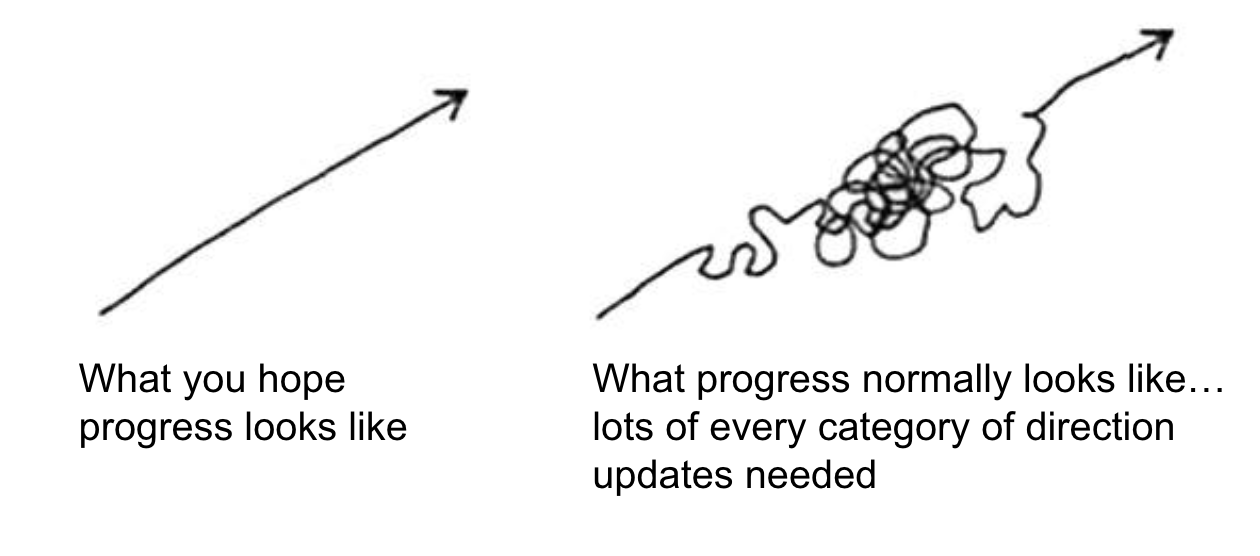Constant course corrections: IMO one should be doing constant course corrections
/By Duncan Anderson. To see all blogs click here.
Reading time: 4 mins
Summary: If you are doing something you’ve not done before you should be doing constant course corrections. Failure to do so will likely lead to failure! No course corrections is likely eventual death.
Repetitive Vs Non repetitive tasks
"Science is really in the business of disproving current models or changing them to conform to new information. In essence, we are constantly proving our latest ideas wrong." David Suzuki
More and more of the tasks for knowledge work are non repetitive. So in effect one lens on what one is doing is ‘disproving current models or changing them to conform to new information.’ Be this as a venture capitalist, a content creator at Edrolo, a teacher in a classroom, a real estate agent, a friend!
So if you don’t have ‘constant course corrections’ for non repetitive tasks then it’s likely you are not improving… or, if you are running a business, eventually the business will fail.
Types of course corrections
Almost everything can be upgraded infinitely. But more than that, "Any year you don't destroy a core belief is a year wasted." Munger
Want the 10 degree direction upgrades. Want to know when we are at a dead end, ie to stop doing something. Want to know when we are 180 degrees off course.
Taxonomy of direction updates:
10 degree course correction - small change - feels fine
90 degree course correction - medium change - doesn't feel great
stop - large change (this is a deadend) - feels embarrassing
180 degree course correction - extra large change (it wasn't just not useful, it was counterproductive!) - feels shocking
Don't hide from the latter three. They might hurt but they are healthy for you. Think of them as squats at the gym!
Progress hoped for vs Progress actual
I try to do a unit of ‘metacognition’ for a major project at least weekly to see how we can update the course. Almost every time I do a unit of metacognition I can find a course correction update.
Outcome = 1. Metacognition * 2. Execution
“You don’t learn from your experiences, you learn from reflecting on your experiences.” Dewy
You don’t learn from doing a task, you learn from your ability to explain how and why you do the task AKA metacognition.
The better you can explain what you have been doing (metacognition) normally the better you understand what you have been doing.
When I’m talking about ‘course corrections’, I’m normally talking about levelling up one’s metacognition.
Some examples:
Venture capitalist
Levelling up how you make decisions about whether to invest or not. Not just changing how you make decisions.
Levelling up how you work with portfolio companies. Not just changing how you deal with portfolio companies.
Teacher
Levelling up how you engage in an interactive discussion with the class on theory. Not just changing how you do discussion.
Levelling up in how you build relationships with students. Not just changing how you try build relationships.
Edrolo content creator
Levelling up the macro recipe for what the product is. Not just changing the macro recipe.
Levelling up how you actualise the macro recipe with an updated ‘machine’.
Real estate agent
Levelling up the approach you have to get a listing.
Levelling up the way marketing campaigns are run for a house.
Metacognition = 1. Can explain what you were doing before + 2. Can explain the changes you have come up with + 3. And can explain why you believe the changes will be an upgrade
Not metacognition = Random changes = Just changing without taking the time to explain why what you are doing is different and hopefully an upgrade.
If you only take away one thing
Try to do constant course corrections.
Try to have metacognition for all course corrections that are understandable, scalable and transferrable.
“To improve is to change, to be perfect is to change often.” Winston Churchill.
Jingle: Doing the same thing over and over again is boring / path to irrelevance. Changing without understanding why is stupid. To course correct with metacognition constantly is sublime.

